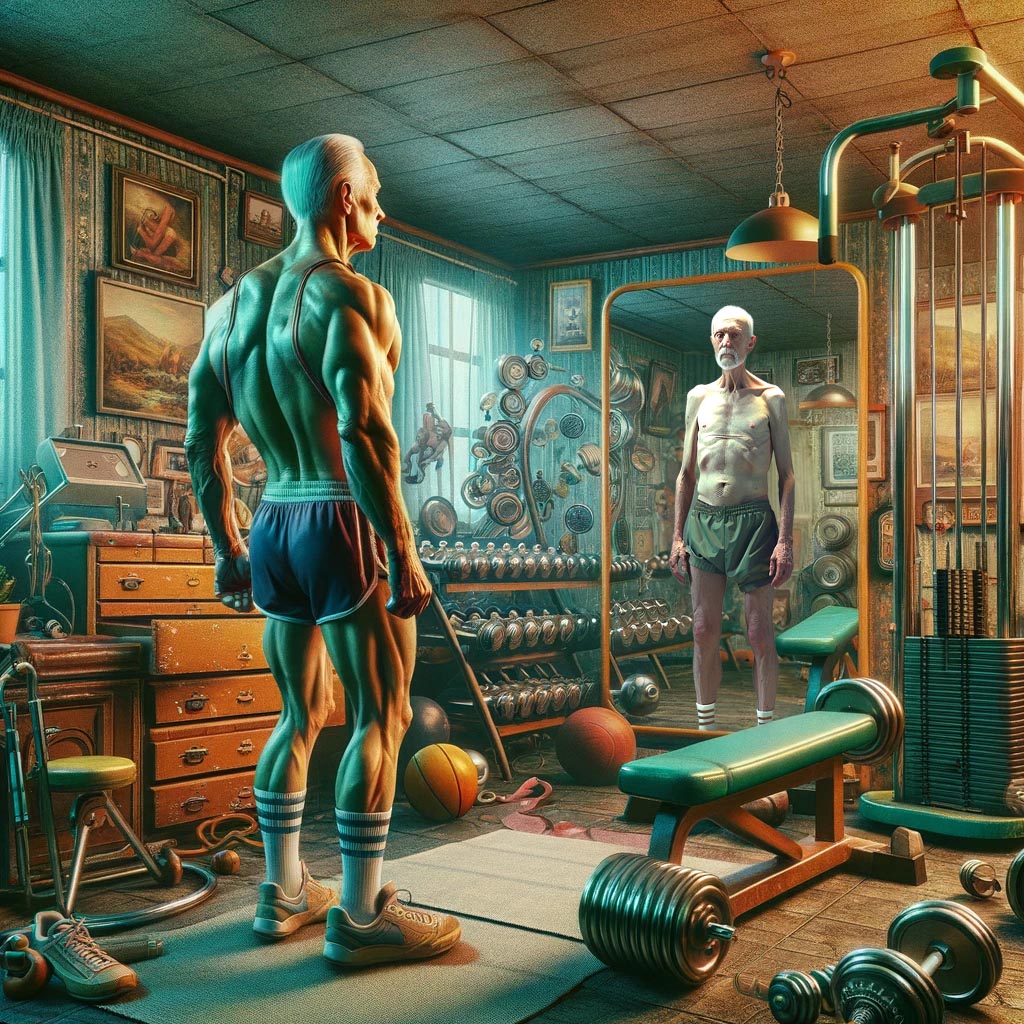Ever heard of “manopause”? No, it’s not exactly like the female version, but it does signify a ride on the hormonal rollercoaster that many men experience, often with less screaming and more silent brooding. Testosterone deficiency, or low T as it’s more commonly known, isn’t just a fancy medical term invented to sell supplements—it’s a real issue that can affect every facet of a man’s life. [link] Testosterone holds the key to your vitality. But what happens when your levels start to dip and how do you know if yours is low or not?
Testosterone 101: What It Is and Why You Need It
Imagine your body as a complex machine—testosterone is the premium fuel that keeps it running smoothly. This mighty hormone, produced mainly in the testicles, is the architect behind your muscle mass, bone density, and facial hair. It’s what turned you from a boy into a man during puberty, giving you that deep voice, increased height, and, yes, that sudden interest in the opposite sex.
But testosterone’s job description goes beyond just physical appearance and reproductive functions. It also plays a role in mental health, helping to keep depression at bay and keep your cognitive functions sharp. [link] Ever felt a surge of confidence before a big presentation or during a competitive game? You can thank your testosterone levels for that.

Keeping your T levels within a healthy range is not just about maintaining your sex appeal or muscle mass; it’s about preserving your zest for life and your overall well-being.
As men age, it’s natural for testosterone levels to begin their slow descent. However, when they drop too low, the effects can be as noticeable as the difference between a charged and dead battery in your favorite gadget. Low T can lead to a host of unwelcome changes, such as fatigue, mood swings, and a dwindling interest in sex—pretty much the antithesis of what many consider the hallmarks of manhood. [link]
Unless you’re looking forward to a future of napping through your favorite sports games, struggling to stay motivated at work, or feeling indifferent about your sex life (which, let’s be honest, no man ever wants), it’s time to pay attention to what your body is telling you. Keeping your T levels within a healthy range is not just about maintaining your sex appeal or muscle mass; it’s about preserving your zest for life, your mental sharpness, and your overall well-being.
Signs You’re Running Low: Symptoms of Testosterone Deficiency
Feeling more like a vintage car that’s lost its vroom? That could be low-T playing tricks on you. Before you start blaming your job, your in-laws, or Netflix for not having enough action movies, let’s identify the real culprits. Symptoms of testosterone deficiency sneak up like uninvited party crashers, and they’re not here to liven up the place. Decreased libido is often the headline act, but there’s more to the show. Fatigue sets in, not the “I just ran a marathon” kind, but a more “why am I tired after a full night’s sleep?” feeling. Then there are mood changes; one minute you’re fine, and the next, you’re feeling down for no reason, like a teenager minus the acne and angst. [link]
And let’s not forget the loss of muscle mass and increased body fat – because low T thinks it’s funny to mess with the one thing you’ve been working on at the gym. [link] These symptoms can easily be brushed off as just getting older or the stresses of life piling up. However, attributing them solely to a busy schedule or “just a phase” is like ignoring a check engine light because your car still starts. Sure, it runs, but for how long and how well?
The Diagnosis Dance: How to Tell If Your T is Truly Low
So, you suspect your T might be on the low side. What to you do? First, don’t just take an online quiz and self-diagnose. The internet might tell you that you’re either perfectly fine or have a rare tropical disease. The real first step? Visiting your doctor. Yes, it involves making an appointment, waiting in a lobby that hasn’t been redecorated since the ’90s, and actually talking about your feelings and symptoms.

The real first step in detecting a problem? Yes, visiting a real-life human doctor, in person.
Getting diagnosed starts with blood tests, which are as fun as they sound, especially if needles aren’t your thing. But think of it as a pit stop to check your internal engine. Remember, normal levels can vary widely, so it’s less about hitting a specific number and more about where you fall on the spectrum.
This process can feel like a mystery tour where you’re not sure of the destination. You’ll have discussions about your lifestyle, your health history, and yes, your sex life. It’s like opening up to a stranger about your deepest secrets, except this person has a medical degree and can actually help you. The adventure might include more tests to rule out other conditions because your body likes to keep things interesting.
The Manly Benefits of Zinc(Opens in a new browser tab)
Boosting Your T: Treatment and Management Strategies
So, your T levels have taken a dive, and you’re looking to get back in the game. Fear not, for the world of testosterone boosting is vast and filled with options ranging from the good old-fashioned “eat right and exercise” to the more James Bond-esque testosterone replacement therapy (TRT). Let’s explore the arsenal at your disposal, keeping it light but informative because, let’s be honest, dealing with low T should have at least some perks.
Lifestyle Lifts: What you eat plays a starring role in the testosterone production drama. Focusing on a diet rich in proteins, fats, and specific vitamins and minerals (think zinc and vitamin D) can help give your T levels a nudge in the right direction. [link] It’s not about dieting per se but more about choosing foods that support hormone health. And yes, this might mean breaking up with some of your junk food buddies.
Dietary Do-overs: What you eat plays a starring role in the testosterone production drama. Focusing on a diet rich in proteins, fats, and specific vitamins and minerals (think zinc and vitamin D) can help give your T levels a nudge in the right direction. It’s not about dieting per se but more about choosing foods that support hormone health. And yes, this might mean breaking up with some of your junk food buddies.
Testosterone Replacement Therapy (TRT): For some, lifestyle and diet changes might not be enough. That’s where TRT comes in, offering a direct approach to increasing testosterone levels. It’s available in various forms – injections, gels, patches, and even pellets that a doctor inserts under your skin. TRT is like the tech gadget of the hormone world, offering a high-tech solution but with the caveat that you need to use it wisely and under medical supervision to avoid side effects. [link]
Sleep: The Unsung Hero of Your Workout Regime(Opens in a new browser tab)
Natural Boosters and Tech Gadgets: The market is flooded with natural supplements claiming to boost your T. While some have merit (hello, vitamin D and zinc), others might be more hype than help. Always do your homework or consult with a healthcare provider before going down this route. And then there are the gadgets – fitness trackers, sleep monitors, and even apps designed to optimize your health and, indirectly, your testosterone levels. These tools can help turn everyday activities into opportunities for hormone health.
Navigating the world of testosterone boosting is a journey – one that might involve lifting weights, saying no to that second slice of pizza, or explaining to your partner why you’re wearing a patch that’s supposed to turn you back into the man you remember. But with the right approach, you can steer your testosterone levels back to where you want them, all while keeping your spirits high and your body in top form.
Lifestyle Lift: Diet, Exercise, and Sleep’s Role in Testosterone Levels
If you’re looking to give your T levels a leg up, remember the holy trinity of men’s health: diet, exercise, and sleep. It’s like the health version of “eat, pray, love,” except it’s more like “eat right, lift, sleep well.”
Nutrition: Let’s talk grub. It takes the right fuel to produce testosterone. Think of it as putting premium gas in a sports car. Foods rich in Vitamin D, zinc, and healthy fats (think avocados, not fried chicken) are your best bets. So, the next time you’re about to chow down on a burger, maybe swap it for salmon. Your taste buds might protest, but your hormones will thank you.

Exercise: As for exercise, lifting weights isn’t just for bodybuilders or those guys in commercials trying to sell you protein powder. It’s for anyone looking to pump up their T levels. And HIIT? It’s like speed dating for your cells, quick and effective at getting your hormones to mingle and increase.[link]
Sleep: Lastly, don’t skimp on sleep. It’s tempting to binge-watch your favorite series until 3 AM, but your testosterone levels drop faster than the plot in the last season. Aim for 7-9 hours of quality sleep. Yes, that might mean saying goodnight to your phone earlier, but it’s a small price to pay for hormonal harmony.
Embracing the Journey with a Smile
Navigating the world of testosterone deficiency is less about enduring and more about thriving. So understanding what low T means, recognizing the signs, diagnosing it correctly, and exploring a buffet of treatment options. We’ve also highlighted the sacred trio of diet, exercise, and sleep in the quest for optimal testosterone levels.
Remember to take it one step at a time. Adjust your diet, get moving, catch those Z’s, and consider medical options if necessary. Facing low T is like dealing with a tricky hand in poker—you play it smart, make your moves, and sometimes, you just have to bluff your way through.
Approach your health journey with optimism, a dash of sarcasm, and the willingness to seek help when you need it. After all, it’s about feeling great, living well, and having the last laugh. Here’s to your health, happiness, and a hormone level that lets you enjoy both.
| Low-T Statistics |
| Hidden in Plain Sight: Up to 40% of men with low testosterone (hypogonadism) don’t experience any noticeable symptoms, making it a challenging condition to diagnose. [source] |
| Simple Blood Test: Fortunately, diagnosing low testosterone is relatively straightforward. A simple blood test can measure testosterone levels and help determine if further evaluation is needed. [source] |
| Exercise and Testosterone Levels: Engaging in regular physical activity, particularly resistance training, has been shown to increase testosterone levels in men. A meta-analysis of studies found that resistance training programs lasting 8-12 weeks, with at least 2 sessions per week, resulted in an average increase of 13.4% in testosterone levels. [source] |
| Sleep and Testosterone: Prioritizing quality sleep is crucial for maintaining healthy testosterone levels. Research suggests that men who consistently sleep less than 7 hours a night experience lower testosterone levels compared to those who get adequate sleep. |
| Beyond Medication: While testosterone replacement therapy (TRT) is an option for some men with severe hypogonadism, it’s important to note that it’s not the only solution. Addressing underlying health conditions, managing stress, and optimizing dietary choices with essential nutrients like zinc and vitamin D can also support healthy testosterone levels. [source] |
You might also like:



